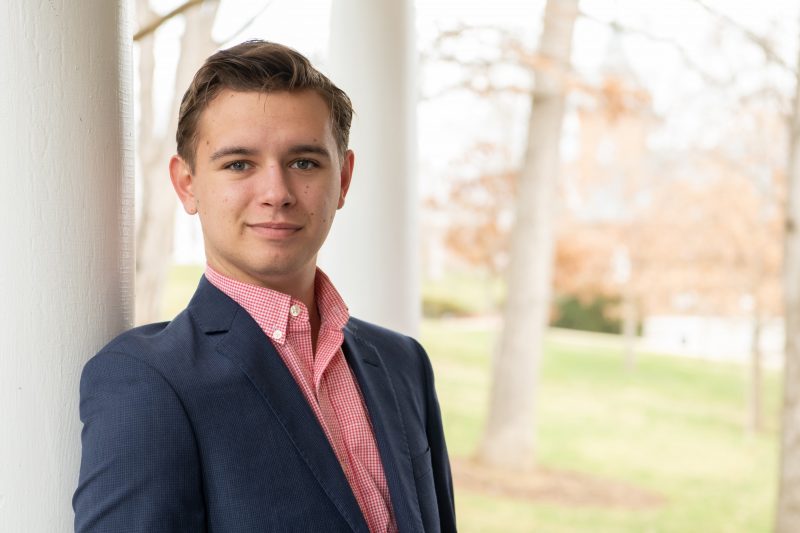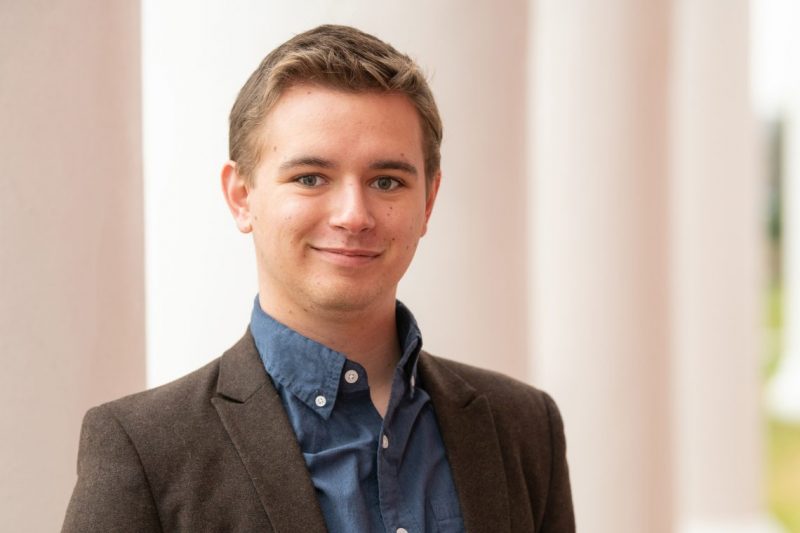The Right Fit At W&L, Gareth Minson '20 has been able to forge his own educational path at the intersection of political philosophy, education policy and women, gender and sexuality studies.
“There were a few Virginia schools I considered, but Washington and Lee set itself apart from the others in a couple key dimensions.”
~ Gareth Minson ’20
Major: Political Philosophy
Minor: Women, Gender, and Sexuality Studies; Education Policy
Q: What factors led you to decide to attend W&L?
I lived in Manassas, Virginia, until my 10th birthday, when my family moved to Delaware; four years later we moved to Pennsylvania and then the next year we moved to Arizona. When I was graduating high school in the desert and thinking about what was next, I knew it was a chance to pick my home and I knew I was going to go back to Virginia.
There were a few Virginia schools I considered, but Washington and Lee set itself apart from the others in a couple key dimensions. The first was the academic profile. My high school in Arizona, Veritas Prep, was a liberal arts charter school. I loved the liberal arts method and philosophy. Washington and Lee has phenomenal professors and liberal arts education. At other schools I might have had to apply to a major or struggle to take classes outside of my major. The other thing for me was W&L took integrity seriously with the Honor System. At other schools, there is rampant, proud cheating and other barriers to community development, but our system protects us from that to a significant degree.
Q: Why did you decide to pursue these areas of study, and where do you hope they might lead you in your future career?
In my first year, it was a common to say that you don’t major in a department, you major in a professor. I ended up in my programs because of the professors.
Assistant Professor of Politics Stuart Gray drew me into political philosophy with his wonderful class in my first year – in the end, I will have studied with Professor Gray in six classes, written a thesis, and done summer research. Redenbaugh Associate Term Professor of Economics Tim Diette, Associate Professor of Education Haley Sigler and Assistant Professor of Education Eric Moffa teach wonderful classes and helped me realize that caring about education and making it better systemically involves policy, not just talk.
Associate Professor of History Sarah Horowitz leads the incredible Women, Gender, and Sexuality Studies Department. I met her at the academic fair in my orientation week. Ultimately, I think WGSS is the liberal arts discipline. I took a history class with Professor Horowitz, but she is my advisor for the classics, politics, and philosophy WGSS-related courses. The discipline challenges preconceptions in necessary ways. Class discussion on 20th century clothing in Professor Horowitz’ class, “History of Women and Gender in Modern Europe,” changes my perception of how the subtlest things iterate and reiterate societal structures—often oppressive structures.
I want to work in public policy and all three programs encourage me to solve problems creatively and with good reasons. Because the Education Policy Program requires time working in classrooms with children, I will always have the stakeholders of the education system in mind. Studying political philosophy, from works like Hesiod’s “Works and Days” to Bonnie Honig’s “Public Things,” forces me to try to answer important questions like Raymond Geuss’ question on ideology: He asks, “Who is telling what to whom and for whose benefit?” Just policy makers should ask that question. Once, in a fourth-grade classroom, a student said he wasn’t doing his online homework. When his classmates asked why, he said, “because I live in the woods.” That moment stands out as a place where policy ought to intervene to provide all students quality education. WGSS pushes me to examine who is marginalized, what are my/our biases, and how I can make it better.
Q: What does your job as Burish Intern Coordinator entail, and what have you enjoyed most about that experience?
A part of the Education Studies Department, the Burish Service Leadership Program connects our university to local schools for volunteer programs. Each of our seven partner schools has a primary partner student, the intern, and I support the 10 interns in a largely administrative capacity. From a birds-eye view of the whole network, I can help with specific problems the interns face, recruiting and sorting volunteers, working with the university for institutional support, and encouraging the interns.
I have gained tremendous experience in this position and learned new skills.
Yet the most enjoyable part of the job is when I get to tell others about the tremendous work the interns do. Katherine Reid recruits more than 15 university students to spend lunch mentoring elementary students at Fairfield Elementary, more than 20 minutes away. Julie Phipps loves the children at Natural Bridge Elementary so much that she weekly spends 11 hours with at-risk students. Emma Thai created enough supplementary enrichment programs at Waddell so that all the students can attend one. And these are only three examples of the wonderful work I get to support.
Q: You were awarded a Public Policy and International Affairs Junior Summer Institute Fellowship at Princeton for summer 2019. What was that experience like and what kind of lasting impact did it have on you?
My PPIA JSI at Princeton was the best thing way I could have spent last summer. I am incredibly grateful to Laura De Olden, Dean Centeno, Dan Meuse, Elia Sartori, Cherma, the staff and all my classmates for the experience.
PPIA’s mission is to bring people that are so often left out of the policy process, people from racial or ethnic minorities or low-income communities, to decision-making positions. My classmates came from Nepal, Haiti and Syria; held DACA status; represented wealth and poverty; and they all taught me so much.
The fellowship and the mentoring gave me a five-year professional plan, narrowed my personal goals, inspired me, and so much more. Our courses taught me about developing policy, and I am so proud of the proposal my cohort wrote. Going forward, I will use the academic and personal lessons making just policy for all.
Q: You are also president of Rotaract. What is Rotaract and what have you enjoyed most about that role?
Rotaract is the college affiliate of Rotary International, sponsored by the Sunrise Rotary Club in Lexington. Founded here by Laura Calhoun ’20, we are a community service organization. We try to work with the Lexington, home and worldwide communities. While I have been a part of the team, we have bought winter clothes for children at local schools, supported Lisa’s House at Project Horizon, built with Habitat, and written thank-you notes for W&L staff and Valentine’s Day Cards for seniors.
I function partly as our treasurer, so I can quote fundraising numbers or similar data points, but I’m most proud of a change Laura Calhoun, Bri Karpowich ’20 and I made for W&L fundraising. Drives used to take one of two forms: collecting items or collecting money. For our first clothing drive, we were concerned that people would give us unwanted clothes because we thought there were more respectful donations for the people we were helping and we did not want to just raise money. Our compromise was to list the prices of coats, hats, gloves, etc. from Walmart when we tabled and offer to go buy the items if students donated the cost. That solution worked extremely well for us in every drive after that. I recently saw another group adopt that method for a Project Horizon drive and I think that this could be a great contribution to the community service fundraising model at W&L.
Q: Has anyone at W&L been a mentor to you?
Professor Gray has been a wonderful mentor. It has been so much fun learning with him. In Contemporary Political Philosophy last year, he structured the course as a criticism of neoliberalism and certain economic impulses. Applying for policy jobs this year, I keep those criticisms in mind. Economic well-being should be important to policy makers, but interest in finances cannot replace care for the human person.
Professor Horowitz has been an incredible mentor since the first time we met at the academic fair. Her relentless work for the WGSS Department has expanded the number of minors. The cohort feels much larger now than when I registered, and so does the reach, as so many student organizations plan events with the department. Even when outsiders question the validity and worth of the department and its courses, Professor Horowitz laughed off the critics and grew the program.
If you know any W&L students who would be great profile subjects, tell us about them! Nominate them for a web profile.
More about Gareth
Q: You don’t really have a hometown, but where have you lived?
Manassas, Virginia; New Castle, Delaware; Bala Cynwyd, Pennsylvania; Scottsdale, Arizona; and Boonton, New Jersey
Q: What’s your favorite restaurant or shop in Lex?
Don Tequila
Q: What do you usually get there?
Chimichanga
Q: What one book or film do you recommend to everyone?
“Circe” by Madeline Miller
Q: Favorite W&L event?
Nabors Service Days
Q: Favorite spot on campus?
On the Front Lawn, just in front of Payne Hall
Q: Favorite class so far?
Contemporary Political Philosophy
Q: Favorite W&L memory?
Dinner with WGSS faculty and Rebecca Traister following her book talk on “Good and Mad: The Revolutionary Power of Women’s Anger”
 Gareth Minson ’20
Gareth Minson ’20 Gareth Minson ’20
Gareth Minson ’20
You must be logged in to post a comment.